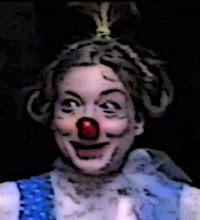Cilincing is a poor community in the northern outskirts of Jakarta. It takes us over an hour of driving to get there. We leave the city, it seems to me, and drive through the country-side before arriving in a village area. But Dan tells me we are still within Jakarta city limits. This city seems to have no limits. And it’s full of different “kampungs.” Kampung means village in Indonesian, and in the Jakarta area it refers to a poor slum area. In the kampung here of Cilincing, my partner Dan has set up an outreach program and comes to do circus with the kids two to three days a week. I join him to give the kids clown workshops.
First day I go there, it has started raining. It is the wet season in Indonesia now. You need an ATV [all-terrain vehicle] to navigate the gigantic pot holes flooded with water that make up the village road (or as Dan suggested, a monster truck).
The community we’re going to lives down by the shipping dock, past an industrial area of cranes, rusting barrels, gigantic anchor chains, et cetera, where the children run about and play, and goats wander. Chickens and cats, too. The community lives off the sea, harvesting small fish and cockerels. We pass rows of wooden boards where the fish are placed to dry. At the end we come upon a maze of ramshackle wooden and cement houses. Dan leads the way through tiny meandering alley-ways to a small house that has the biggest space he could find for the children to have their circus workshop. It is about 16’ x 14.’ An old woman, whose children are now grown-up and out of the house, lets the circus use her home. Where they used to practice got flooded out.
Because it’s pouring rain, we only have a few students today. I learned some of the names (but didn’t catch them all yet) – Misno, Ino, Ipul, Rais, Dedi, Jajat. For the first hour they practice the circus skills they have already been working on with Dan – juggling balls, clubs and rings. Then it is time for clowning and I do a workshop with them focusing on creative movement and expression. We do silly dancing, funny walks and goofy faces. The kids are game to play and are having a blast.
This is a very poor village and many of the children don’t go to school because the family can’t afford it, they need the kids to work. The mother of one little girl refuses to let her daughter go, because, as she claims, it is a “waste of time.” Sometimes the youngsters themselves have lost the motivation to bother with an education. They are not given much guidance and support in that area, having sometimes to beg their parents to let them go to school. And they struggle with self-esteem, feeling they have no prospects and no possibilities.
Learning to juggle is great for these children, therefore, because through the accomplishment of this acquired skill, they build a sense of possibility, confidence, self-esteem and discipline. To learn how to juggle, you have to keep practicing. It is something concrete they can focus on. In a while, they experience the results of their diligence. They can juggle three balls, and then four, and maybe five. Then they learn rings and clubs, and how to pass to each other. And, of course, it is fun! The idea is then for them to transfer this experience to other areas in their lives—to the pursuit of an education and the possibility of a better future.
This is not just circus but social circus. Dan has really taken on the task of improving these children’s lives in every area that he can positively impact – through the vehicle of circus. He provides guidance and encouragement for their study and their relationships in the community. He works towards creating the possibility for them to go to school, talking to both the kids and their parents about its importance; or if they are enrolled, making sure they go. He intervenes when a child is having trouble and provides a forum for communication and problem-solving. Dan has a really good way that he communicates with and relates to the kids. He teaches them social responsibility—to be responsible for your actions and your choices. To be kind to one another and work together. When you are here at the circus, this is a safe place, and no one will make fun of you or put you down.
Subscribe to:
Post Comments (Atom)

















No comments:
Post a Comment